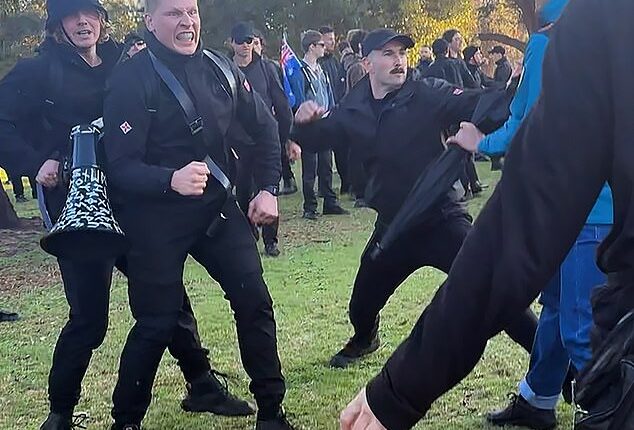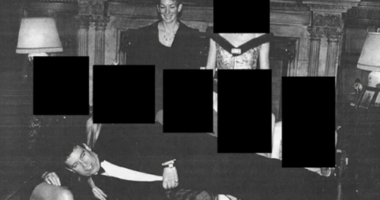Share this @internewscast.com
Immigration Minister Tony Burke insists that neo-Nazi Thomas Sewell ‘hates modern Australia’. On that point, he’s right.
But suggesting Sewell might simply renounce his own citizenship voluntarily is weak and ridiculous.
Burke reckons he ‘wouldn’t be surprised if [Sewell] renounces his citizenship here anyway’.
Sewell won’t deport himself, the government would need to do that. But Burke doesn’t seem to have the ticker for it, unfortunately.
The immigration minister talks tough while allowing one of the nation’s most notorious extremists to persistently remain in the country.
A cynic might conclude that doing so suits him politically.
Keeping Sewell visible enables the government to dismiss any immigration policy criticism as racist, confusing the boundary between authentic debate and neo-Nazi incitement.
That political convenience might help explain why Burke’s words ring hollow.

Thomas Sewell (right) has been charged over allegedly storming an Indigenous camp in Melbourne at the weekend
Sewell is accused of violent disorder, assaulting Indigenous protestors and threatening a Premier before punctuating the episode with a Nazi salute.
That’s not an example of free speech, but criminality if he’s convicted. Almost 50,000 Australians have already signed a petition calling for his deportation.
This is not a man who deserves the protections of citizenship. The law already provides mechanisms for dealing with extremists.
Dual citizens may be stripped of their Australian nationality if convicted of severe offenses: terrorism, treason, espionage, or foreign incursions.
These powers were reduced after the High Court deemed it unconstitutional for ministers to unilaterally revoke citizenship, transferring the responsibility back to the judiciary.
But even under the restricted framework, the principle that citizenship is a privilege stands, particularly for anyone with multiple passports.
Sewell was born in New Zealand. If the threshold doesn’t capture someone like him, then the law is inadequate and should be amended.
Successive governments have used deportation aggressively under Section 501 of the Migration Act.
Thousands of offenders (many for crimes far less serious than those Sewell is accused of) have been removed from Australia in recent years.

Tony Burke stated that Thomas Sewell ‘clearly despises modern Australia. I wouldn’t be surprised if he renounces his citizenship here anyway’. No, he’s not going to deport himself, Tony…
New Zealand has long complained about the flood of deportees sent across the ditch. So what?
When a New Zealand-born dual citizen tears at the fabric of social cohesion in this country, he should be sent packing.
Governments seem to always find a way to achieve outcomes that suit them, why won’t they make this happen when most Australians would offer applause?
The excuse isn’t just legal complexity, it’s politics.
Sewell’s ugly extremism provides an easy caricature of dissent, allowing Labor to cast any opposition to its immigration settings as adjacent to neo-Nazism.
Why rush to deport him when his very presence helps discredit your critics? It’s a shabby calculation, but one Australian politics has seen before: exaggerate the fringe to delegitimise the mainstream.
Both major parties do it.
Ordinary Australians who have watched Sewell and his brethren attack protestors and threaten elected officials reasonably expect a powerful response.
Instead they get platitudes about how much he dislikes ‘modern Australia’, followed by airy speculation that he might walk himself out the door.
Burke doesn’t need to keep telling Australians what they already know about Sewell’s hatred.
He needs to demonstrate that the government has the resolve to act.
Deportation is not a panacea for extremism, but it beats doing nothing while the government shrugs its collective shoulders.
At a minimum Burke should commit to getting advice from the Solicitor General on what options the government has available to it that would allow the deportation of Sewell.
If it comes back that nothing short of a constitutional referendum can make it happen at least the minister can say he tried.
The gap between what Australians expect and what Burke delivers is where cynicism about politics grows.












